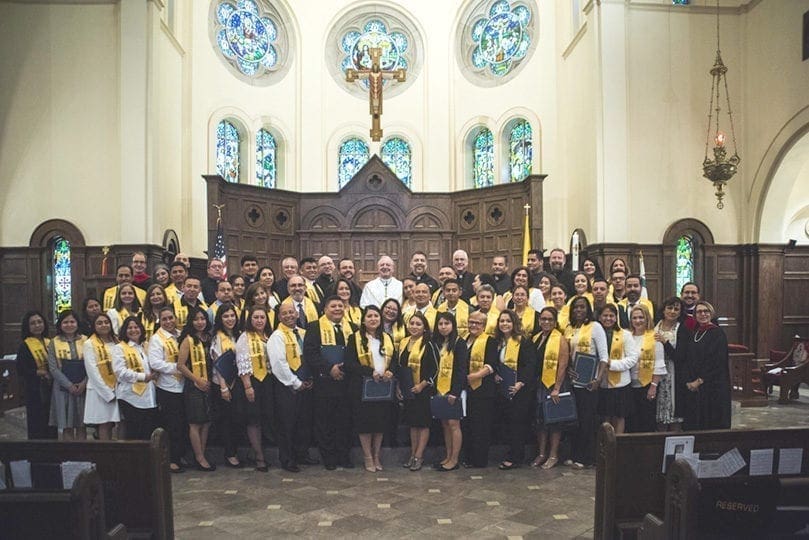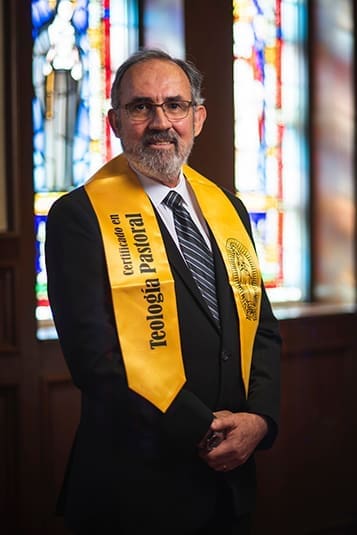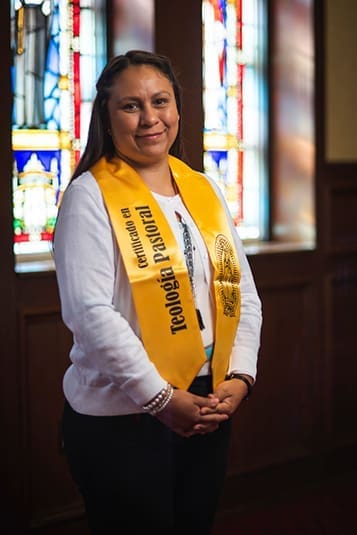 Photo by Enrique Samson
Photo by Enrique SamsonAtlanta
Pastors welcome 53 graduates who will help them catechize in Spanish
By PRISCILLA GREEAR, Special to the Bulletin | Published May 16, 2019 | En Español
ATLANTA—An innovative program equipping parishes with catechetical leaders trained in Spanish for ministry has graduated its third class.
Fifty-three leaders representing 30 Hispanic ministries from Blairsville to Peachtree City received a certificate in pastoral theology in April. They successfully completed three years of online Catholic study in ministry and theology in Spanish.
At the April 27 graduation Mass at Holy Spirit Church, Bishop Joel Konzen, SM, commissioned the graduates to go forth in Christ to catechize, evangelize and edify through Hispanic parish ministry.
The archdiocese launched the program in 2013. They collaborated with the University of Dallas Neuhoff School of Ministry to create an online Spanish format for the curriculum offered on the Catholic university’s campus.
The program creatively addresses the critical need for more Hispanic Catholic parish ministers, while lowering the barriers of cost, distance and rigid schedules.
Since it began, 177 people have graduated, representing 49 archdiocesan parishes and missions where Mass is celebrated in Spanish. The initiative responds to the steady Hispanic growth of the U.S. Catholic Church. In 2017, Hispanic Catholics made up 36 percent of the U.S. Catholic population and 52 percent of those under 30, according to the Public Religion Research Institute.
Bishop Konzen challenged graduates to use their talents and knowledge for building God’s kingdom.
“I am thankful that so many are responding to the call to minister to the Spanish-speaking and to the large number of Hispanic Catholics throughout North Georgia. In our official region of the church—Florida, Georgia, North Carolina and South Carolina—there are nearly 1,000 Masses each weekend in Spanish and 570 parishes with some form of Hispanic ministry,” the bishop said.
Meets desperate need
Monica Oppermann, associate director of evangelization in the Office of Formation and Discipleship, is happy with the program’s development and support by priests, 16 of whom attended the graduation. Pastors are invited to nominate two people per class, who receive a 40 percent archdiocesan scholarship.
“The university has a high level of studies. Because it’s difficult, not very easy, we are really trying to target those leaders who are going to bring the knowledge to the parish and serve the parish, usually in leadership roles. We have people who have been with us in the program and now are directors of religious education in Spanish at the parish and in adult formation. Several work at the parish,” she said.
Father Mark Starr, pastor of St. Clare of Assisi Church in Acworth, sponsored three students in the first class as well as new graduate Martha Rodriguez. She will assist in RCIA, catechesis, Bible study, baptism preparation and more at St. Clare’s, which draws 400 to Spanish Mass.
“She has a great love for the faith and wanted to learn more and engage our Hispanic community in the faith,” he said.
He’s nominated two more students for the incoming class.
“We desperately need catechist training to help with our parish school of religion classes and adult faith formation. This program will help equip our parishes to form children and adults in the faith and I hope to move towards retaining the faithful so they do not leave once the sacraments have been achieved. That is a very difficult problem in both English and Spanish communities,” Father Starr said.
Creative format
In fall and spring semesters, students take two theology classes and one pastoral class over 15 weeks, watching a weekly video lecture by Dallas faculty and completing assignments. Courses range from Scripture and church history to youth ministry. Students must pass 75 percent of coursework. The certificate is comprehensive but less demanding than a degree program. Graduates meet academic requirements for master catechist certification.

Jamie Botero
Photo By Enrique Samson
A University of Dallas professor kicks off each semester with a class at the Chancery in Smyrna where students attend Mass and receive books. Students are divided geographically for online discussion and optional study, prayer and fellowship together. Directors believe the online format, personal support and collaborative nature make for a winning combination, which was honored with a 2017 New Wineskins Award from the National Conference for Catechetical Leadership.
“They can do it from home, and they are communicating with us because we have these networking events, we have a forum. So they stay in touch with each other, they know each other, and I have them in groups from the regions,” Oppermann said.
The yearly cost, including books, is $850. The archdiocese will pay 40 percent for two students nominated by their pastor from every church, with the parish and student paying the remainder. Students can also study independently, paying full tuition.
The program sharpens research skills so that students know how to find and analyze information. In addition to theology, CPT emphasizes pastoral topics in the American context.
“You can understand the basis of everything in meeting Christ and having that relationship with him,” Oppermann said.
Equipping lay ministers
Graduate Jaime Botero, an engineer, was already serving as a lector at Divino Niño Jesús Mission in Duluth but wanted more preparation in Spanish to expand his ministry. He especially loved courses on Christology and morality.
“I thought the best way was to study. It’s wide ranging and gives tools to continue to grow in faith,” said the Colombia native, who is now planning a catechetical series at the mission. “The program in general really draws the person to Jesus.”
New graduate Gloria Mancillas of St. Francis of Assisi Church, Blairsville, called the experience “a jewel.” With two sons, ages 13 and 21, and a cleaning business, she appreciates the convenience of the online format.

Gloria Mancillas
Photo By Enrique Samson
“Since I began to study, God has opened many doors,” she said in Spanish.
“Now I’m the leader of the Hispanic community. … I’m helping the priest with different ministries. I’m giving baptismal prep. … I’m leading a prayer group,” she said. “Many mothers like me with families don’t have the opportunity to go to the university to study this type of class that the archdiocese is facilitating for us. The truth is, we are very blessed.”
She feels more equipped to invite others to Christ and the church and inspired “by God’s love.”
“I see the face of God in my brothers and sisters, and I’ve seen the hunger and thirst for God that they have in not being evangelized,” she said. “It’s not just that I know, but now my mission is to teach others through evangelizing.”
Mancillas moved to California from Mexico when she was 12 and recalls missing beloved Mexican traditions like Our Lady of Guadalupe novenas and drifting away from the church. She would like to give young people support so they don’t repeat that experience.
“That is what caught my attention, to be able to help the new generation that arrives as youth here, to help them to adapt to the church,” she said.
Father Carlos Vargas, pastor of Good Samaritan Church, Ellijay, sponsored three new graduates to serve his vibrant half-Hispanic congregation, largely Mexican and Guatemalan.
“It’s a permanent community and is growing. We have an established community here, working people who are really close to the church,” he said.
And his flock is hungry for formation.
“The program is a wonderful opportunity we have as pastors to send people. They can study and learn more about the church, about its history, theology and the Bible,” he said. “They really want to learn and be part of it. I think there’s a lot of potential.”